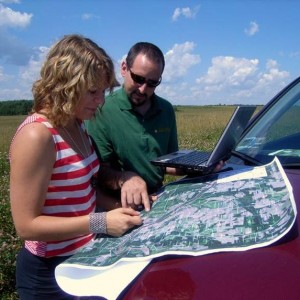A team of University of Maine at Presque Isle professors evaluating the feasibility and sustainability of producing grass biomass in central Aroostook County is seeking landowner input to better understand past land usage and future interest in growing the renewable resource.
Specifically, the team is hoping to have Fort Fairfield landowners with 10 or more acres of land participate in a survey that covers agricultural resources, farming experiences, and their perspectives on grass biomass as a potential land use and production activity. There are nearly 200 landowners that fit that description and the team is hoping to get responses from a majority of them. Team members have been working since the summer to conduct these surveys, which need to be completed by early December. The survey takes about 10 minutes to fill out and can be accessed at www.umpi.edu/epscor-survey.
“What we’re studying is the potential of perennial grass production to supplement farm incomes, create jobs in Aroostook County, and add to the County’s portfolio of clean, renewable, ‘home grown’ energy sources,” Dr. Jason Johnston, project team leader and UMPI Assistant Professor of Wildlife Ecology, said. “The data we gather in these surveys will help to give us a much clearer picture of how feasible this is.”
The project is part of the University of Maine’s Sustainability Solutions Initiative and is coordinated with ongoing grass biomass research by the University of Maine Cooperative Extension Service. The UMPI team recently received $89,988 in grant funding from the Experimental Program to Stimulate Competitive Research [EPSCoR] to continue its research on this project, which is titled Assessing the Feasibility and Sustainability of Grass Biomass Production in Central Aroostook County through Research and Stakeholder Partnerships. The project area, which is the most populated region in northern Maine, encompasses the communities of Presque Isle, Caribou and Fort Fairfield.
EPSCoR is a program under the auspices of Maine’s Office of Innovation. EPSCoR grants are awarded by the National Science Foundation to states that are typically not targeted for research grants. The funding UMPI has received is part of a larger grant led by the University of Maine in Orono and the University of Southern Maine.
During its grant year, the UMPI team will continue to evaluate the feasibility and sustainability of grass biomass production for central Aroostook County using the watershed as a sampling space and the community of Fort Fairfield as a way to focus on one stakeholder municipality.
In addition to Johnston, this year’s team includes Dr. Kimberly Sebold, Associate Professor of History, and Dr. Chunzeng Wang, Associate Professor of Earth and Environmental Science. Also on the team is David Vail, the Adams Catlin Professor Economics, Emeritus, at Bowdoin College, and Andrew Plant with the University of Maine Cooperative Extension.
Their work involves quantifying the land resource using GIS and satellite imagery, conducting economic analyses, opening a dialogue with stakeholders, and assessing ecological impacts. They also will conduct a historical account of agricultural land use practices and use this information to encourage local landowners to consider past, present, and potential future land uses. In addition, they will work with a local farmer to install a test plot to measure the potential yield gains realized from managed vs. unmanaged hay plots. As in past years, the team is collaborating with many state and regional stakeholders and will be hiring several undergraduate and high school students to help in conducting this research.
“Aroostook County has experienced a considerable decline in farm acreage since its peak in the 1940’s,” Johnston said. “While some of this land was converted to tree farms or other uses, much of it remains idle, in some stage of succession, or is mowed annually to maintain future land use potential. Our project looks at the future economic development potential of this land, so we’re very interested in talking to farmers with a diversity of opinions on the potential of grass biomass, non-farm landowners, potential custom operators and any others who have an interest in the subject.”
Once the UMPI team is able to collect enough survey data, they will analyze it and conduct focus groups and key informant interviews during the winter months. In the next year, the team will begin taking what it has learned in Fort Fairfield and reaching out to other central Aroostook County communities.

